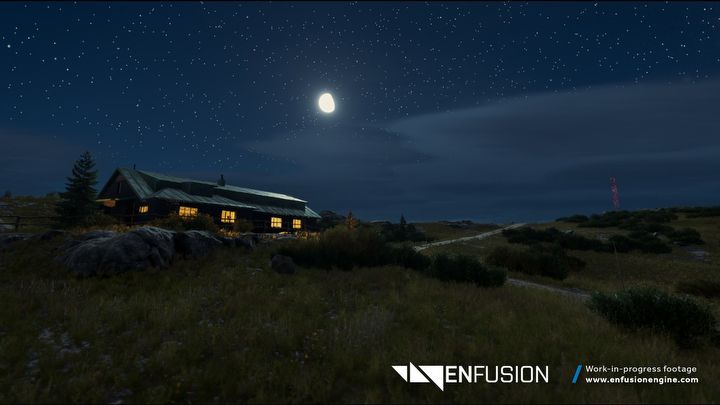ArmA 4's Enfusion Engine on Official Presentation
Bohemia Interactive presented the full version of Enfusion Engine. The new engine will not only provide nicer graphics and better performance, but will also make it much easier to create mods.

- Bohemia Interactive presented Enfusion Engine, which will be used to create its next games;
- The engine will provide nicer audiovisuals with better performance compared to the Real Virtuality Engine;
- In addition, the technology will allow for easy modding and improved networking code;
- The studio will soon release the engine along with documentation and playable demos.
We had to wait a long time for Czech studio Bohemia Interactive to present its new project. No, it's not the next installment of ArmA (yet). The Czech team showed off the full version of the Enfusion Engine - a new proprietary technology that will be the platform for their games in years to come. So far we could only see a de facto prototype version combined with the older Real Virtuality Engine in DayZ.
We've been hearing about this engine for quite some time, most recently through unofficial leaks. The developers have already mentioned the biggest change - the use of ready-made, easy-to-edit scripts. Until now, Bohemia Interactive used the Real Virtuality Engine, which was based on so-called hard coding (which, as we know by the way, does not work well in the long run). Therefore, as early as 2014 a new technology was thought of, which was eventually eveloped across four years.
Of course, the developers could have used commonly available engines using similar solutions, for example Unreal Engine. However, Bohemia Interactive wanted to stay with the technology tailored to the studio's needs: huge open worlds, in which fans can easily create their own creations. This is why Marek Španel - founder and president of Bohemia Interactive - and the rest of the developers wanted to create their own, future-proof engine:
“Since Bohemia Interactive was founded 22 years ago, we have always preferred to use our own in-house engine. No other engine available on the market allowed us to create the kind of games we wanted, i.e. simulations with detailed physics operating in massive scale open worlds that players and communities can easily customize. Nothing has changed about that. However, our aging Real Virtuality engine, used in our Arma 3 title for example, has increasingly run up against its technological limits. Enfusion, on the other hand, is ready to face the technological challenges of the future and will without exaggeration form the shape of our games into the next decade."
Enfusion Engine is designed for multiplatform titles that will be released on PC and consoles from the Xbox and PlayStation families (no mention of Switch). The whole thing is based on the C programming language and the Enforce scripting language.
Of course, an important part of the engine are the audiovisuals. You can see how the graphics look like thanks to screenshots provided by the developers, apparently showing the island of Everon, known from Operation Flashpoint: Cold War Crisis and ArmA: Cold War Assault.
At the same time, Enfusion Engine is supposed to use CPU and GPU resources more efficiently. In practice, this will translate into more stable performance in games, which will also be much prettier than Bohemia Interactive Studio's current productions.
Speaking of stability, the creators have also reworked the network code, The only thing mentioned so far is that it will make the multiplayer experience more enjoyable. Much more has been revealed about the Enfusion Workbench - a set of tools such as editors for the world, particles, scripts, animations and much more. All are expected to be simple to use and connected to Bohemia Interactive's back-end systems. This will make it easy for fans to create their own modifications.
The team is still working on the project, but will soon make the engine available online along with user manuals and the first playable demos. The Czechs have also stressed that, for now, they have no intention of enabling other game developers to use the Enfusion Engine.
0

Author: Jacob Blazewicz
Graduated with a master's degree in Polish Studies from the University of Warsaw with a thesis dedicated to this very subject. Started his adventure with gamepressure.com in 2015, writing in the Newsroom and later also in the film and technology sections (also contributed to the Encyclopedia). Interested in video games (and not only video games) for years. He began with platform games and, to this day, remains a big fan of them (including Metroidvania). Also shows interest in card games (including paper), fighting games, soulslikes, and basically everything about games as such. Marvels at pixelated characters from games dating back to the time of the Game Boy (if not older).
Latest News
- This is expected to be the biggest year in the company's history. Blizzard prepares an offensive that will overshadow previous years
- Bethesda envied CD Projekt RED? Starfield may undergo a Cyberpunk 2077-style metamorphosis
- Season 2 has just started, and Todd Howard is already writing the script for the third one. Fallout 5 will be changed by the TV show
- 5 games to grab on Amazon Prime Gaming. Among them, a collection of RPG classics
- My experience attending the 2025 Game Awards, and why I loved it





